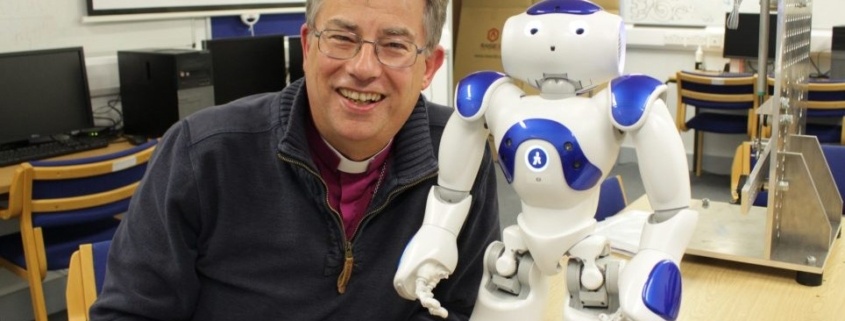The ethical complexity of new technologies can seem overwhelming. The Bishop of Oxford offers five key questions for keeping ethics at the centre of AI strategy.
Bishop Steven urges the government to consider implementing a Code of Practice for both Hate Crime and wider legal harms.
The Rt Revd Steven Croft’s speech in the House of Lords on Tackling Intergenerational Unfairness, from 25 January.
The Bishop of Oxford, the Rt Revd Steven Croft, spoke in the House of Lords during today’s Lords debate on the technological and lifestyle efforts to address climate change, and to meet the 2050 net-zero carbon emissions target
My Lords, I welcome this report and this vital debate. Never before in the scale of human history has there been such a wide and deep threat to our ecosystem or to human flourishing. Technology alone is not enough.
In his letter to the whole world in 2016, Pope Francis notes how “the earth herself, burdened and laid waste, is among the most abandoned and maltreated of our poor”.
Our response must be nothing less than an ecological conversion of every person and every part of society. Responding to the current emergency is the responsibility of every family, every workplace, every village, town and city, every company, and every public institution.
The earth is God’s gift as well as God’s creation. Human beings are far more than consumers: we are called to be just stewards of creation, to care for the poorest and the weakest. Human fulfilment lies not in escalating consumption but in meaningful rest and labour and learning to be content.
The Churches and faith communities must play our part and are beginning to do so. The Church of England’s General Synod is to debate the climate emergency next week. The Archbishop of Canterbury’s Lent book this year, Saying Yes to Life, focusses on the environmental crisis. It is supported by an extensive digital campaign – Live Lent – asking every Christian to review their lifestyle choices.
Many dioceses, including Oxford, are placing care for the earth at the top of our agenda for the coming years, recognising the distance we still have to travel. This means measuring and restricting our own carbon emissions, commending lifestyle changes, undertaking energy audits and campaigning for wider change. It means identifying challenging but achievable targets and the practical path to reach them. We need to hear the voice of government in policy detail and not just principle.
The Church Commissioners have led the Transition Pathway Initiative backed by investors representing over $16 trillion in assets under management and advice, increasingly drawing companies into line with net-zero targets. Our sister churches and faith communities are each taking similar initiatives. This summer, hundreds of bishops from across the world will gather for the Lambeth Conference, many from regions already deeply affected by ecological disasters: low rainfall, rising sea levels, fire, flood and hunger. A major theme of our gathering will be the global climate emergency and the response needed by every section of society.
I invite the government to provide clear and ambitious policy signals, as it has just done with petrol and diesel vehicles, and to invite every institution and organisation to engage in this great question of our day so that the leadership we offer to the COP summit is demonstrably grounded in the trinity of policy intervention, technology solutions and the changing lives of our entire population.
Steven Croft
Bishop Steven references the UK FIRES report ‘Absolute Zero’. UK Fires is a collaboration between the universities of Cambridge, Oxford, Nottingham, Bath and Imperial College London that is funded by EPSRC: The Engineering and Physical Sciences Research Council is the main funding body for engineering and physical sciences research in the UK. By investing and postgraduate training, we are building the knowledge and skills needed to address the scientific and technological challenges facing the nation.
Watch Bishop Steven speaking in the debate and follow Bishop Steven on Facebook
The Bishop of Oxford, the Rt Revd Steven Croft, spoke in the House of Lords during today’s question for short debate to ask, ‘what consideration the government has given to the linkage between our leadership of the COP 26 Conference and the pledges we will make at the Tokyo Summit in December.’
My Lords, I welcome this timely debate and the opportunity offered by the Tokyo Nutrition for Growth Summit.
It is moving to note that from 2015 onwards, the number of people suffering from hunger has been increasing, albeit slowly. Behind the statistics lie terrible and moving stories of human suffering, of disease and death across Asia and sub-Saharan Africa. It is sobering to ponder, on the one hand, the challenge of providing a sustainable diet and preventing the lifelong consequences of malnutrition, and on the other, the striking rise in obesity across the world and the consequent health problems.
Seven years ago, the UK Government exercised global leadership through the first Nutrition for Growth conference and has delivered on many of the pledges made there. I support the calls made by other noble Lords in this debate for a renewal of that leadership at the Tokyo summit, for a strong United Kingdom delegation, and for generous pledges of £800 million per year for nutrition between 2021 and 2025.
The Tokyo summit will take place just a few weeks after the key COP 26 conference in Glasgow, which the UK Government will host and chair.
Short term interventions to combat malnutrition are vital, but the world must also engage with the long term multiple linkages between poor nutrition and climate change.
Climate change is already having a negative impact on the four pillars of food security: availability, access, usage and stability. The climate emergency means that the world needs to increase spending on nutrition adaption and mitigation just to stand still.
We see across the world the impact of extreme weather-related disasters which have more than doubled since 1990. More than 70 per cent of agriculture is rain-fed. This directly affects the ability of drought-affected countries to grow their own food, as we see currently in sub-Saharan Africa and elsewhere. Agricultural land will be lost to rising sea levels, fires and flooding.
Two years ago I was privileged to visit our link Diocese of Kimberley and Kuruman in South Africa. It was excellent to hear reports of local feeding programmes to combat malnutrition, some supported by parishes in the Oxford Diocese. Those signs of hope were set against a background of growing concern about the climate and poor harvests.
There is increasing evidence that high ambient carbon dioxide in the atmosphere decreases the nutritional quality of important food crops affecting the entire world, including wheat, rice and maize. The science suggests lower yields of micronutrients: protein, iron and zinc decrease as CO2 in the atmosphere increases.
Changes in the climate affect agriculture. This, in turn, affects livelihoods and the economy of the affected regions, all too commonly leading both to malnutrition and mass migration in search of a more sustainable future. There is a vicious circle here which can only be broken through a sustained global determination and action to address the climate emergency.
We have a moral imperative to love our neighbour as ourselves, to feed the hungry. We own now a moral imperative as the pioneers of the industrial revolution, and those who have gained most from fossil fuels, to lead on the fight against climate change.
In this context, what consideration has the government given to the linkage between our leadership of the COP 26 Conference and the pledges we will make at the Tokyo Summit in December? Will the government continue to focus our own interventions in the areas of most extreme poverty and climate change?
Steven Croft
Watch Bishop Steven speaking in the debate and follow Bishop Steven on Facebook
Nutrition for Growth (N4G) is a global pledging moment to drive greater action toward ending malnutrition and helping ensure everyone, everywhere can reach their full potential.
The Bishop of Oxford, the Rt Revd Steven Croft, spoke in today’s debate on the Address in the House of Lords.
“My Lords, I rise to speak about the climate emergency and declare an interest as a member of the Advisory Board of the Environmental Change Institute in the University of Oxford.
The minister said in his opening address that Climate Change will test us all. And it will. David Wallace Wells book, The Uninhabitable Earth, should in my view be required reading for every member of this House. Wells begins his graphic description of the future of the Earth with the unforgettable words: It is much, much, much worse than you think. He goes on to describe the effects and the economic costs of bush fires, drought, mass migration, sea and air pollution, flooding and extreme weather. I read Wells early last year and have watched his words become the lived reality of people in California and Australia, across Southern Africa and Indonesia, and closer to home in the floods in South Yorkshire.
We are living through an environmental catastrophe, and that catastrophe will increasingly shape our foreign and domestic policy, our economic life and our politics over the next decade. The science is clear. The needs are urgent. How will we respond?
I welcome all that the minister said. The government are to be congratulated on embracing the target of net zero by 2050. The government are to be congratulated on their ambition to lead the COP talks in November. The talks have the potential to change the world.
The challenge now is to fill out this vision with specific planned action. First we need a detailed accountable plan of how our economy will reach net zero by 2050 or earlier. If we’re serious, we must have a year by year accountable strategy.
Second, governments and responsible investors, including the churches, need to stop investing in and subsidising fossil fuels and invest in renewables here and across the world. As Mark Carney has argued recently very powerfully.
Third bring forward some bold, eye-catching initiatives to show the world that Britain means business and that we can reach these targets: have the courage to bring forward the ban on petrol and diesel vehicles to 2030. Fund an ambitious new energy efficiency programme. Give more detail on the projected investment and mitigation in flood defences here and overseas.
There is a moral imperative to act for the sake of the earth and for the sake of the poorest. Those who have contributed least to climate change are suffering the most and will suffer most in the future. But this is one of those very rare moments when to do the right thing ethically is also to do the right thing for the economic prosperity of the country and our place in the world. The cost of acting slowly is increasing.
The 2018 forest fires in California cost $400 billion, the equivalent of the entire US Defence budget. Every year now counts.
Your Lordships will remember the story in the Book of Genesis of Pharoah’s dream, interpreted by Joseph. Seven fat cows consumed by seven thin cows. Seven years of plenty eaten by seven years of famine. We have no need of Joseph to interpret the impending disaster. We have the IPCC and the global scientific community. But we need a Government with the wisdom of Joseph to use these next seven years well and to put us on the pathway to recovery and set out a new agenda for the next decade for the world.
My Lords we must not fail.”
Steven Croft
Watch Bishop Steven speaking in the debate and follow Bishop Steven on Facebook
The Bishop of Oxford, the Rt Revd Steven Croft, spoke in a debate in the House of Lords this afternoon about protecting and representing the interests of future generations in policy making. Bishop Steven spoke on climate chaos, the rise of artificial intelligence and the impact of both on young people’s mental health.
Join Bishop Steven at the Mass Lobby of MPs on 26 June. Full details here: https://www.theclimatecoalition.org/thetimeisnow
“My Lords, I warmly welcome this debate and want to express my appreciation to Lord Bird for his intiative and his proposals. Lord Bird has set out very well the case for a Select Committee and for a Future Generations Commissioner.
The moral case has shifted in recent years. In the Anthropocene era, humanity’s effect on the environment means that that the interests not just of the next generation but every generation beyond that need to be protected in our policy making.
The world is living through deepening environmental catastrophe. The impact of climate change is already severe. It will become worse with each decade and each generation. The world is currently heading for average global warming of 2 degrees and more by 2050. Global net carbon emissions continue to rise. The risks of unforeseen and catastrophic compound effects on the environment increase with every year.
My Lords the two biblical images of hell are a burning planet too hot to sustain life and a rubbish dump. We are in danger of bequeathing both to our children and grandchildren. It is hugely irresponsible – to take short term decisions in the interests of only of the current generation.
I warmly welcome the government’s historic commitment to a net zero carbon economy by 2050 and I congratulate the Prime Minister on naming this goal as a vital part of her legacy. I warmly welcome the government’s international leadership and the bid to host the vital 2020 Climate Summit. These goals need support across Parliament. The voice of those future generations needs to be strengthened in that debate.
Future generations also need to be protected in the rapid pace of technological change. Here I speak as a Board Member of the Centre for Data Ethics and Innovation. The pace of change and the effects of technology on the mental health of the young are significant.
I warmly commend the Information Commissioner’s Office recent guidelines on Age Appropriate Design, which aim to protect the most vulnerable from the predatory big tech companies. I warmly commend the government for bringing forward the Online Harms White Paper. I hope both will be turning points in the development of new technologies which protect rather than exploit the most vulnerable.
We will need in the coming years agility and public leadership in responding to new technologies and data in the areas of health, education, the labour market, smart cities, algorithmic decision making, facial recognition and the regulation of the mining of personal information for commercial gain. The interests of future generations need a voice.
Finally these proposals are so helpful in that they address a decrease in social cohesion across the generations. The APPG on Social Cohesion recently published a comprehensive study on intergenerational connection.
The generations have become increasingly segregated. We can allow that process of drift to continue with serious social consequences. Or we can exercise leadership to build social capital between the generations. Families and faith communities have a vital role to play and are part of the glue which binds generations together. Local government has a role as does business and the third sector. But national government must play its part.
The proposals to give a structured voice to the interests of future generations is warmly to be welcomed. I warmly support Lord Bird’s proposals and hope they will attract the support of the whole House.”
Steven Croft
- Watch Bishop Steven speaking in the debate and follow Bishop Steven on Facebook
The Bishop of Oxford, the Rt Revd Steven Croft, spoke in the House of Lords yesterday as the House debated Further discussions with the European Union under Article 50 of the Treaty on European Union.
“My Lords, I always rise to speak in this Chamber with some fear and trepidation but never more so than today: not only because of the expertise, passion and conviction in this Chamber but also the jeopardy in which we find ourselves as a nation and a Parliament.
My journey through the Brexit process is that for seven years until the referendum year, I was the bishop in Sheffield and South Yorkshire, where some of the communities voted by almost 70% to leave the European Union. I moved shortly afterwards to the Diocese of Oxford, where the three counties, by and large, are significantly in favour of remain.
I suspect that historians will look back on this process and focus not so much on the calling of the referendum or even the referendum itself but on the long period of indecision and paralysis that has followed. I spent some time in Canterbury Cathedral some weeks ago and stood on the place where Thomas Becket was murdered. We were reminded in the cathedral of Eliot’s play Murder in the Cathedral. In his moment of great peril and jeopardy, Becket is visited by four tempters who, in the play, become his four assassins.
I think four significant temptations have grown in proportion to become dangerous assassins facing Parliament in the coming weeks.
The first is to allow our course to be shaped by self-interest and personal ambition. This Brexit debate has been marred from the beginning, it seems, by the narrow calculation of those hoping to gain or retain high office. From the perspective of the country, nothing has undermined trust in our politics more than this untrammelled ambition, which is apparent to all.
I do not single out a particular party or a section of a particular party. One of the dangers of our politics at present is that personal ambition is being put before the country and I think we need to draw that period to an end with great urgency, lest our politics and our confidence in democracy be damaged for a very long time. Conversely, nothing will restore trust in our politics more than putting the interests of the nation ahead of personal position.
The second temptation is to allow yourself to be swayed by narrow party interests and the pursuit of or retention of power in the short term. The issues at stake here are much greater than the rise and fall of particular parties or factions. We need our MPs and Peers to act in the greater national interest and for national unity. I would argue that Parliament needs to come together if the nation is to come together and emerge from this long period of division and introspection.
The third temptation is nostalgia—a romantic attachment to the past. It is wrong to imagine that we can reverse the effects of one referendum by another or go back to a time before the Brexit debates began, when all was well, or go back still further to a different age of independence and imagined glory. We cannot. We must deal with the world as it is, not as we would like it to be, and steer our course accordingly; the leadership that we offer will be judged by this measure.
The fourth and final temptation is idealism: in a world of difficult choices and necessary compromise, holding on to an ideal which is no longer tenable, whether it is a particular kind of leaving or remaining or something else. This, it seems to me, is currently the greatest barrier to positive cross-party consensus. A coming together across Parliament is impossible without the willingness to compromise, and one of the encouraging features of recent weeks has been cross-party engagement.
As others have said, there are huge issues facing our world and our country: climate chaos, care for the poorest, increasing equality and opportunity, our changing relationship with technology, and the challenge of social care and health funding. We cannot allow our national attention to be diverted from these issues by prolonging still further a series of adjustments to our relationship with Europe. The nation is looking to its political leaders for a strong, compelling and united vision of the future that enables us to see beyond these debates in a way that brings unity and common purpose.
The most reverend Primate the Archbishop of Canterbury has spoken in this House about the vital importance of reconciliation in these debates and the protection of the poorest in society. The most reverend Primate the Archbishop of York has written of the need to preserve trust and confidence in our democratic institutions through a time of significant national jeopardy. I hope and pray that, in the midst of these difficult debates, we will be able to turn aside from those four temptations, seek meaningful compromise and act for the common good. I underscore the request to the Minister to lay out for us the ways in which the Government will continue to foster cross-party collaboration and listening, move towards a positive consensus and work to draw Parliament and the country back together.”
Steven Croft
- Read Bishop Steven’s speech in Hansard
- Coverage of Bishop Steven’s speech in the Daily Mail
- Watch Bishop Steven speaking in the debate and follow Bishop Steven on Facebook
Developing Artificial Intelligence in the UK
For the past year, I’ve been a member of the House of Lord’s Select Committee on Artificial Intelligence. The Committee of 13 members received 223 pieces of written evidence and took oral sessions from 57 witnesses over 22 sessions between October and December. It has been a fascinating process.
The Committee’s report is published today. It’s called AI in the UK: ready, willing and able? You can find it on the Committee website.
When I first started to engage with questions of Artificial Intelligence, I thought the real dangers to humankind were a generation away and the stuff of science fiction. The books and talks that kept me awake at night were about general AI: conscious machines (probably more than a generation away if not more).
The more I heard, the more the evidence that kept me awake at night was in the present not the future. Artificial Intelligence is a present reality not a future possibility. AI is used, and will be used, in all kinds of everyday ways. Consider this vignette from the opening pages of the report…
You wake up, refreshed, as your phone alarm goes off at 7:06am, having analysed your previous night’s sleep to work out the best point to interrupt your sleep cycle. You ask your voice assistant for an overview of the news, and it reads out a curated selection based on your interests. Your local MP is defending herself—a video has emerged which seems to show her privately attacking her party leader. The MP claims her face has been copied into the footage, and experts argue over the authenticity of the footage. As you leave, your daughter is practising for an upcoming exam with the help of an AI education app on her smartphone, which provides her with personalised content based on her strengths and weaknesses in previous lessons…
There is immense potential for good in AI: labour saving routine jobs can be delegated; we can be better connected; there is a remedy for stagnant productivity in the economy which will be a real benefit; there will be significant advances in medicine, especially in diagnosis and detection. In time, the roads may be safer and transport more efficient.
There are also significant risks. Our data in the wrong hands mean that political debate and opinion can be manipulated in very subtle ways. Important decisions about our lives might be made with little human involvement. Inequality may widen further. Our mental health might be eroded because of the big questions raised about AI.
This is a critical moment. Humankind has the power now to shape Artificial Intelligence as it develops. To do that we need a strong ethical base: a sense of what is right and what is harmful in AI.
I’m delighted that the Prime Minister has committed the United Kingdom to give an ethical lead in this area. Theresa May said in a recent speech in Davos in January:
“We want our new world leading centre for Data Ethics and Innovation to work closely with international partners to build a common understanding of how to ensure the safe, ethical and innovative development of artificial intelligence”
That new ethical framework will not come from the Big Tech companies and Silicon Valley which seek the minimum regulation and maximum freedom. Nor will it come from China, the other major global investor in AI, which takes a very different view of how personal data should be handled. It is most likely to come from Europe, with its strong foundation in Christian values and the rights of the individual and most of all, at present, from the United Kingdom, which is also a global player in the development of technology.
The underlying theme of the Select Committee’s recommendations is that ethics must be put at the centre of the development and use of AI. We believe that Britain has a vital role in leading the international community in shaping Artificial Intelligence for the common good rather than passively accepting its consequences.
The Government has already announced the creation of a new Centre for Data Ethics and Innovation to lead in this area. The Select Committee’s proposals will support the Centre’s work.
Towards the end of our enquiry, the Committee shaped five principles which we offer as a starting point for the Centre’s work. They emerged from very careful listening to those who came to meet us from industry and universities and regulators. Almost everyone we met was concerned about ethics and the need for an ethical vision to guide the development of these very powerful tools which will shape society in the next generation.
These are our five core principles (or AI Code) with a short commentary on each:
Artificial intelligence should be developed for the common good and benefit of humanity
Why is this important? AI is about more than making tasks easer or commercial advantage or one group exploiting another. AI is a powerful technology which can shape our understanding of work and income and our health. It’s too important to be left to multinational companies operating on behalf of their shareholders or to a tiny group of innovators. We need a big, wide public debate. It’s also vital that as a society we encourage the best minds towards using AI to solve the most critical problems facing the planet. It would be a tragedy if the main fruits of AI were simply better computer generated graphics or quicker ways to order takeaway pizza.
Artificial Intelligence should operate on principles of intelligibility and fairness
This is absolutely vital. There is a striking tendency in AI at the moment to anthropomorphise: to make machines seem human. This looks harmless at first until you begin to consider the consequences. Suppose in a few years time you are unable to tell whether that call from the bank is from an AI or a person? Suppose you apply for a job and the decisions about your application are all taken by a computer?
Suppose that computer is using a faulty data set, biased against you but you never get to know that? There are already a number of chatbots available offering cognitive behavioural therapy. Some of them charge money. Suppose they get better and better and imitating humans. What is to prevent vulnerable people being exploited? Regulation and monitoring is needed not for the first generation of developers (who are mainly very ethical) but for the generation after that.
Artificial intelligence should not be used to diminish the data rights or privacy of individuals, families or communities.
The Cambridge Analytica and Facebook scandals erupted the week after the Select Committee agreed its final report. They underline the need for this principle. Data is the oil of the AI revolution. It is vital to fuel machine learning and wide application of AI. But data also contains the essence of identity and personality. It is fundamental that our data is safeguarded and not exploited.
All citizens have the right to be educated to enable them to flourish mentally, emotionally and economically alongside artificial intelligence.
AI is a disruptive technology. Some jobs will diminish or disappear. New jobs will emerge—but they will be different and probably not there in the same numbers as the jobs we lose. Inequality will increase unless we take positive steps to counter this. The economic predictions are uncertain. It is however absolutely clear that the only way to counter this disruption is education and lifelong learning. That education is not only about reskilling the workforce. There is a universal need for everyone to learn how to flourish in a new digital world. Providing that education is the responsibility of government.
The autonomous power to hurt, destroy or deceive human beings should never be vested in artificial intelligence.
Autonomous weapons are a present reality and a future prospect. This will change warfare for ever. The UK’s position on them is, at best, ambiguous: we use definitions which are out of step with the rest of the world. The Select Committee calls on the government for much greater clarity here and again, for a wider public debate. Deception is already a feature of AI in cyberwarfare and covert attempts to change perceptions of truth and public opinion. Unless we guard values of public truth and courtesy and freedom then our society is vulnerable.
Artificial Intelligence is here to stay. It has the capacity to shape our lives in many different ways. This is the moment to ensure that humankind shapes AI to serve the common good and all humanity rather than allowing AI driven by commercial or other interests to shape our future and our national life.










